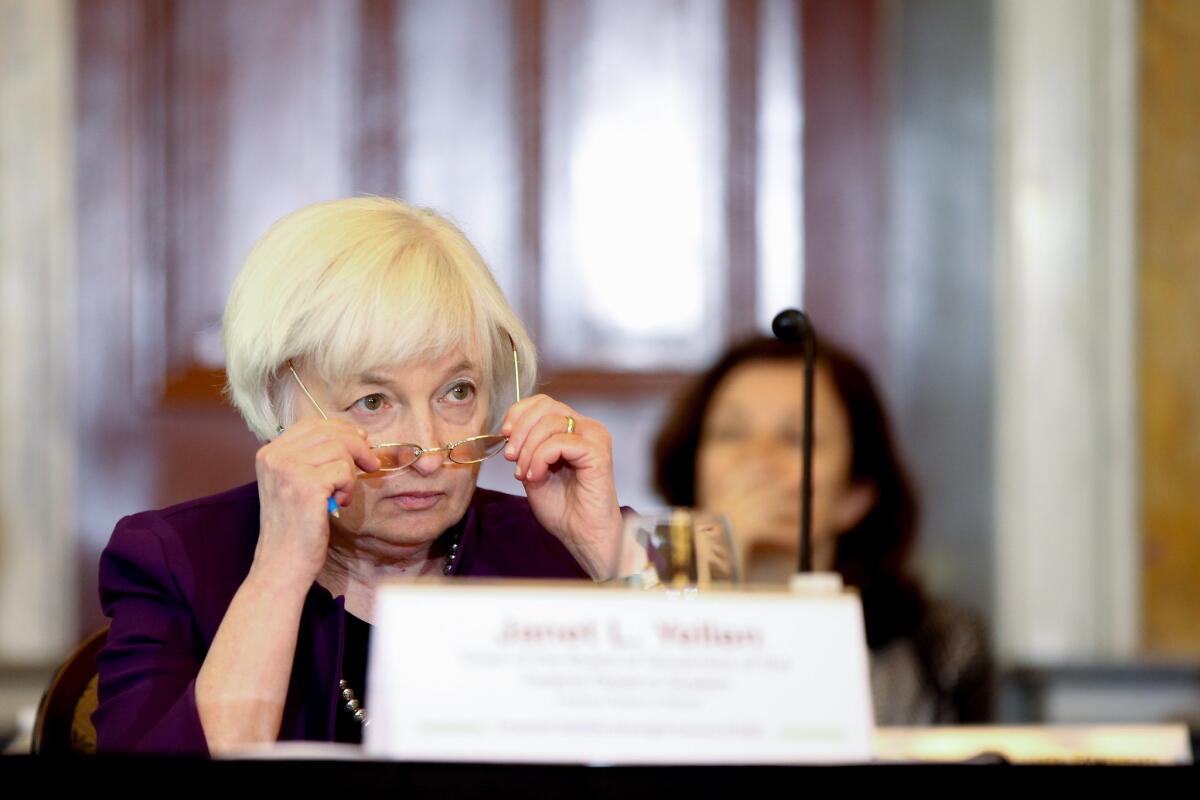Want to make money in the stock market? Pay no attention to the Fed chair

- Share via
Anyone playing the stock market gets inundated with investment advice of all sorts--their broker, their bankers, their astrologers, the crackpot on the corner.
But who gives some of the worst advice? According to veteran investment analyst Burton Malkiel, that would be the head of the Federal Reserve. In a Wall Street Journal op-ed Tuesday, Malkiel took aim at recent pronouncements by Fed Chair Janet Yellen about the “potential dangers” of “quite high” stock market valuations, as well as her earlier warning about biotech and social-media stocks with “substantially stretched” valuations.
“Such comments, he wrote, “are ill considered and are more likely to do more harm than good.”
He’s one of the very few stock market experts whose words should be heeded.
Malkiel, 82, is the author of one of the enduring classics among investment guides--”A Random Walk Down Wall Street,” first published in 1973 and since then never out of print.
Malkiel’s perception that an actively managed stock portfolio could not beat the broad market over time became the bedrock investment philosophy of such purveyors of passively managed index funds as Vanguard Group. As we wrote about Malkiel in 2013, “he should be dipped in gold and placed on a pedestal in front of the New York Stock Exchange, as a warning to investors that they can’t profit from the brokerages’ rigged game.”
In his Tuesday op-ed, Malkiel observed that Fed officials have no greater expertise than professional investors “in second guessing the collective wisdom of market participants” (he means the wisdom expressed via the broad market indices).
In fact, Yellen’s record stinks. Malkiel observes that since last July, when she proclaimed biotech valuations to be “stretched,” the leading Nasdaq biotech index has gained 40%.
Nor is she alone as a poor stock forecaster. In perhaps the most famous stock market pronouncement by a Fed chairman, Alan Greenspan’s declaration in December 1996 that stock prices were showing “irrational exuberance” was epically wrongheaded. The market rally continued into 2000, and even after the crashes of 2000 and 2007, has shown a long-term gain. Any investor who put $10,000 into an S&P 500 stock index fund immediately after Greenspan’s remark and hung on while reinvesting dividends, Malkiel says, would have $40,000 today.
What underlies this mismatch between Fed bosses’ prognostications and stock market reality is that they’re not paid to buoy the stock market, much less act as market pundits.
Their concerns are the balance-sheet economics of U.S. assets, which often are at cross purposes with the workings of the stock market. Greenspan, for example, didn’t seem to recognize that U.S. asset prices--especially housing, but not so much in stocks--reflected excessive debt, which he had a hand in promoting as Fed chief. If he were truly concerned about that trend, Malkiel suggests, he should have taken steps to pare back bank leverage. If he thought stock prices were fueled by overly tolerant margin lending, he should have raised margin requirements.
Instead, he tried to jawbone stock prices down via what Malkiel calls “gratuitous statements about equity valuations.”
Malkiel raises legitimate questions about the purpose of Yellen’s cautionary remarks on stock prices. If she’s trying to steer individual investors into safer long-term investments, she’s taking the wrong approach--with today’s rock-bottom interest rates, fixed-income investments don’t yield enough to help the average American save for retirement; once Yellen’s Fed starts raising rates, fixed-income holdings such as bonds will fall in value.
“Ms. Yellen and Fed officials should understand that their utterances will be interpreted as investment advice,” Malkiel observes, horrified. “We know that investors generally move money in and out of the stock market at exactly the wrong times. For the Fed to appear to encourage this kind of behavior is a very bad idea.”
Keep up to date with the Economy Hub. Follow @hiltzikm on Twitter, see our Facebook page, or email [email protected].
More to Read
Inside the business of entertainment
The Wide Shot brings you news, analysis and insights on everything from streaming wars to production — and what it all means for the future.
You may occasionally receive promotional content from the Los Angeles Times.











